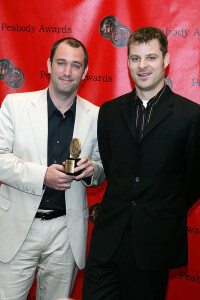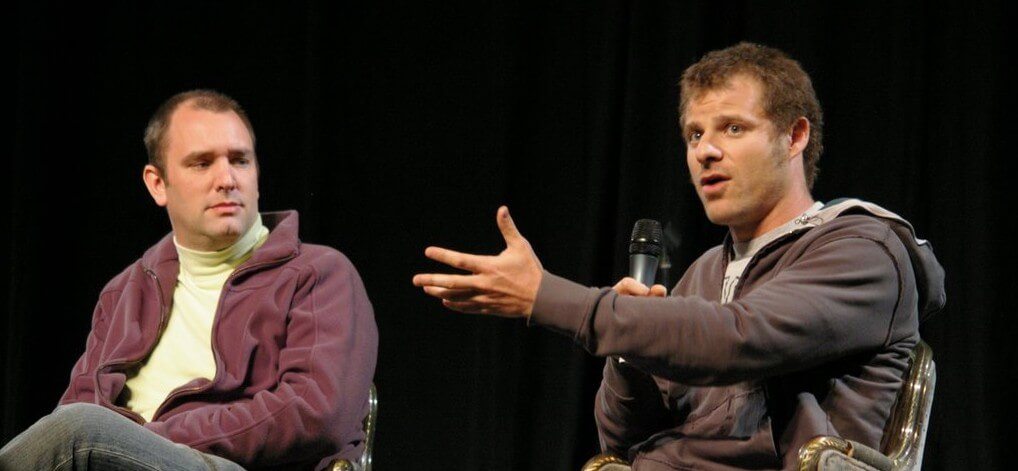South Park: still young at 19
[dropcap]O[/dropcap]n reaching 19 years of age, most things in life start to go downhill. Tax returns, crushing social expectations, responsibilities… previously only words, they now materialise as very real horrors on the horizon. The world of TV is no different (one need only look at the depressing decline of The Simpsons which now, at 27, has gone on far too long).
So how is it that, in its nineteenth season, South Park has bucked the trend to produce one of the best years of its run, and indeed some of the funniest television? The answer undoubtedly lies in the perfection of its new continuity format, trialled in Season 18, where all episodes are woven together by an overarching narrative. For its latest incarnation, creators Trey Parker and Matt Stone spin political correctness as the central thread.

Image: Kigsz / Wikimedia Commons
The arrival of new character PC Principal and his cohort of PC frat-bros drives the townspeople to reassess their crass, ‘Dumpsville’ image and push for gentrification – the pinnacle of which, of course, is having a Whole Foods, because, as Randy Marsh (voiced by Trey Parker) pleas, it “would instantly validate us as a town that cares about stuff”.
The show’s treatment of gentrification is spot on; a mish-mash of artisan cafes, ‘fusion’ cuisine, and expensive ‘loft’ residences that still preserve the edgy charm of the disgruntled “lower-income” populace. It will have anyone who lives in a ‘revitalised’ urban area (shout out East London) in tears.
Towards the series’ climactic last three episodes, it’s revealed both ‘PC’ culture (which is hilariously dismantled to have the more sordid meaning of ‘pussy-crushing’ for white, male fraternity who preach it to get laid) and gentrification are part of a more sinister ploy, the mastermind of which is… adverts.

Parker and Stone, the show’s creators. Image: Peabody Awards / Flickr
Personified as an alien race that constantly evolve around ad-blocks, Ads have taken human form and infiltrated society, distracting us online by posing ‘sponsored’ content as real content. Butters’ dad (Parker) recounts in a nightmarish, dystopian vision of internet use “I … try to read the news story — but it’s not a news story it’s a slideshow, and then I’m looking at the worst celebrity plastic surgery jobs ever”, a painfully apt take on a modern struggle.
In true South Park fashion, the only thing that can save the world from ‘admageddon’ is a return to a core, American, value: guns. Following the logic of a gun-lobbyist’s wet-dream, residents of South Park arm themselves to the teeth and head to the gun show – comically reworked in the style of a dog contest – before miraculously managing to calmly work through their problems, thanks to their firearms.
“Maybe people in this town need to communicate more – care about each other!” they scream before lowering their guns in peace, Randy wistfully commenting “If only we’d had these before, huh?”
The beauty of South Park really lies in its unparalleled ability to stay up-to-date
Parker and Stone’s break-neck production schedule, which sees episodes written, produced and aired in just one week, puts the show at the cutting edge of satire and allows it to explore topical issues: Trump fanaticism, police violence, celebrity culture, and ISIS to name a few.
The inherent spontaneity of South Park lets it quickly ingest the best ‘face-palm’ moments humanity has to offer and regurgitate them on-screen in an stylised, intelligent, and down-right funny way.
Adopting a more cohesive, linear narrative means that now, as in real life, people, ideas and events are all connected, but in totally unrecognisable ways that coalesce to make a zany parody of our universe. The series, now so more than ever, succeeds by defiantly holding up a fun-house mirror to the world in which we can vaguely recognise ourselves and ask: are we really that laughable?

Comments